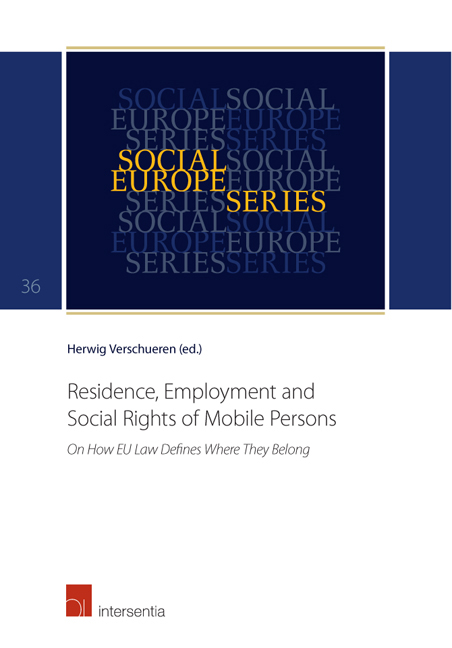Book contents
- Frontmatter
- Preface
- Contents
- List of Abbreviations
- List of Contributors
- Chapter 1 How EU Law Defines where Mobile Persons Belong. An Introduction
- Chapter 2 Family as Link. Explaining the Judicial Change of Direction on Residence Rights of Family Members from Third States
- Chapter 3 The Direction of the Court's Family Reunification Case-Law. A Plea for (Timely) Moderation
- Chapter 4 Sufficient Resources and Residence Rights under Directive 2004/38
- Chapter 5 Free Movement of Persons and European Solidarity. A Melancholic Eulogy
- Chapter 6 Once a Foreigner, Always a Foreigner. Who Does Not Belong Here Anymore? Expulsion Measures
- Chapter 7 Who Does Not Belong Here Anymore? A Statistical Snapshot of Member States’ Practices
- Chapter 8 Civic Integration Exams in EU Immigration Law. What Integration is Not in European Law
- Chapter 9 I Study Here, and Thus I Belong? Mobile Students in the European Union
- Chapter 10 Being Economically Active: How It Still Matters
- Chapter 11 Where Do EU Mobile Workers Belong, According to Rome I and the (E)PWD?
- Chapter 12 Conflicting Rules of Conflict: Social Security and Labour Law
- Chapter 13 Conflicting Rules of Conflict: Social Security and Labour Law. A Response
- Chapter 14 Where Does the UK Belong?
Chapter 12 - Conflicting Rules of Conflict: Social Security and Labour Law
Published online by Cambridge University Press: 22 September 2018
- Frontmatter
- Preface
- Contents
- List of Abbreviations
- List of Contributors
- Chapter 1 How EU Law Defines where Mobile Persons Belong. An Introduction
- Chapter 2 Family as Link. Explaining the Judicial Change of Direction on Residence Rights of Family Members from Third States
- Chapter 3 The Direction of the Court's Family Reunification Case-Law. A Plea for (Timely) Moderation
- Chapter 4 Sufficient Resources and Residence Rights under Directive 2004/38
- Chapter 5 Free Movement of Persons and European Solidarity. A Melancholic Eulogy
- Chapter 6 Once a Foreigner, Always a Foreigner. Who Does Not Belong Here Anymore? Expulsion Measures
- Chapter 7 Who Does Not Belong Here Anymore? A Statistical Snapshot of Member States’ Practices
- Chapter 8 Civic Integration Exams in EU Immigration Law. What Integration is Not in European Law
- Chapter 9 I Study Here, and Thus I Belong? Mobile Students in the European Union
- Chapter 10 Being Economically Active: How It Still Matters
- Chapter 11 Where Do EU Mobile Workers Belong, According to Rome I and the (E)PWD?
- Chapter 12 Conflicting Rules of Conflict: Social Security and Labour Law
- Chapter 13 Conflicting Rules of Conflict: Social Security and Labour Law. A Response
- Chapter 14 Where Does the UK Belong?
Summary
INTRODUCTION
This chapter focuses on the consequences of the co-existence of two systems determining the applicable law for mobile workers, one in the field of social security and one in labour law.
The main principle of the rules determining the applicable legislation of the coordination regulation has always been the lex loci laboris. However, for some categories of workers, including posted workers and workers who normally are employed in the territory of two or more Member States, special rules have been created.
It follows from the Court's case-law that the provisions laid down in the EU regulations determining the legislation applicable form a complete system of conflict rules which are mandatory for Member States and a fortiori for the persons concerned. The worker and his employer do not have the freedom to choose the applicable legislation.
The difference with the law applicable to individual employment contracts is striking. In accordance with private international law, the starting point for the system of conflict of law rules in matters of contractual relations between worker and employer is the parties’ freedom to choose the applicable law. These rules are laid down in the 1980 Rome Convention on the law applicable to contractual obligations; since the Amsterdam Treaty (1999) gave the Union the competence to do so, Regulation 593/20084 was adopted replacing the 1980 Rome Convention.
Posting of workers is a controversial issue in the EU. It follows from the case-law of the Court of Justice that if an employer who is a cross-border service provider posts a worker, this worker is not to be considered covered by Article 45 TFEU and Regulation 492/2011. This means that this worker cannot invoke the equal treatment principle regarding working conditions in comparison to nationals of the host Member State. In contrast, the freedom to provide services gives businesses the right to provide services in another Member State without being discriminated and/or discouraged by the authorities of the host Member State. To that end, they may post their own workers temporarily to the other Member State to carry out the work necessary to provide the services.
- Type
- Chapter
- Information
- Residence, Employment and Social Rights of Mobile PersonsOn How EU Law Defines Where They Belong, pp. 255 - 284Publisher: IntersentiaPrint publication year: 2016



